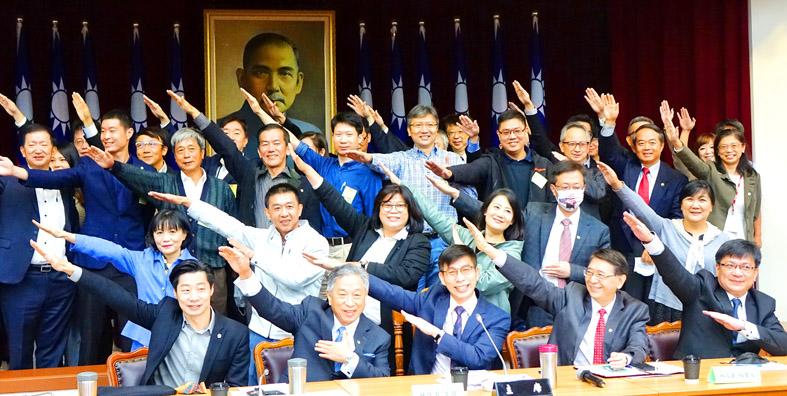Lawmakers yesterday established a Trans-Pacific Aerospace Parliamentary Alliance to deepen relations with Japan and other Asia-Pacific countries to consolidate the nation’s role in the global space economy.
The alliance is chaired by Democratic Progressive Party (DPP) Legislator Chung Chia-pin (鍾佳濱), with New Power Party Legislator Chiu Hsien-chih (邱顯智) and Taiwan People’s Party Legislator Ann Kao (高虹安) serving as deputy chairs. No Chinese Nationalist Party (KMT) lawmaker is involved in the alliance.
The efforts of the National Space Organization (NSPO) and local businesses to develop satellites and ground stations over the past three decades have borne fruit and, hopefully, after the promulgation of the Space Development Act (太空發展法) in June, a national rocket launch site would soon be established to facilitate the development of the domestic local space industry, Chung said.

Photo: Liu Hsin-de, Taipei Times
The alliance aims to foster ties with countries having advanced space technology — such as Japan, South Korea and New Zealand — or emerging space economies such as Indonesia and Malaysia, he said.
Taiwan should utilize its geographical advantages and local manufacturing strength to develop rockets and provide launch services for satellite developers, he added.
While the US did not want Taiwan to develop launch rockets a few decades ago, the trend has “changed somewhat,” as the global space industry has become increasingly commercialized, Chung said.
NSPO Director-General Wu Jong-shinn (吳宗信), who joined the videoconference, expressed the hope that the alliance, with its flexibility as a parliamentary group, would usher in more opportunities to interact with counterparts in Japan, India and other countries.
As low Earth orbit communications satellites are expected to become more like consumer electronics products, local firms should build on their strengths in information and communications technology to enter the global space economy, he said.
While Taiwan cannot participate in the International Telecommunication Union (ITU) due to political factors, many things can be done through parliamentary exchanges, said Jessika Ko (柯莉娟), a lawyer who serves as a consultant to the alliance.
For example, it is important to establish internationally recognized standards for verifying aerospace materials and components, so Taiwanese products can be exported to more countries at higher prices, she said.
She urged the government to establish a more complete legal framework to back up the local space industry, instead of merely treating it as a “fad.”
Promoting space tech used to be the duty of the Ministry of Science and Technology, which oversees the NSPO, while the Ministry of Economic Affairs has started to weigh in and assist local firms to enter the industry, Vice Minister of Economic Affairs Tseng Wen-sheng (曾文生) said.
Taiwan should play a leading role in developing launch rockets in the western Pacific region, as the ability to launch a satellite into space is an amalgamation of a nation’s industrial techniques, he said.
Deputy Minister of Foreign Affairs Tien Chung-kwang (田中光), as well as representatives from National Central University, Odysseus Space, HelioX Cosmos Co, CMOS Sensor Inc, Chunghwa Telecom Co and Epotech Composite Corp, also attended the event.

A decision to describe a Chinese Ministry of Foreign Affairs statement on Singapore’s Taiwan policy as “erroneous” was made because the city-state has its own “one China policy” and has not followed Beijing’s “one China principle,” Deputy Minister of Foreign Affairs Tien Chung-kwang (田中光) said yesterday. It has been a longstanding practice for the People’s Republic of China (PRC) to speak on other countries’ behalf concerning Taiwan, Tien said. The latest example was a statement issued by the PRC after a meeting between Singaporean Prime Minister Lawrence Wong (黃循財) and Chinese President Xi Jinping (習近平) on the sidelines of the APEC summit

Taiwan’s passport ranked 34th in the world, with access to 141 visa-free destinations, according to the latest update to the Henley Passport Index released today. The index put together by Henley & Partners ranks 199 passports globally based on the number of destinations holders can access without a visa out of 227, and is updated monthly. The 141 visa-free destinations for Taiwanese passport holders are a slight decrease from last year, when holders had access to 145 destinations. Botswana and Columbia are among the countries that have recently ended visa-free status for Taiwanese after “bowing to pressure from the Chinese government,” the Ministry

‘SIGN OF DANGER’: Beijing has never directly named Taiwanese leaders before, so China is saying that its actions are aimed at the DPP, a foundation official said National Security Bureau (NSB) Director-General Tsai Ming-yen (蔡明彥) yesterday accused Beijing of spreading propaganda, saying that Chinese President Xi Jinping (習近平) had singled out President William Lai (賴清德) in his meeting with US President Joe Biden when talking about those whose “true nature” seek Taiwanese independence. The Biden-Xi meeting took place on the sidelines of the APEC summit in Peru on Saturday. “If the US cares about maintaining peace across the Taiwan Strait, it is crucial that it sees clearly the true nature of Lai and the ruling Democratic Progressive Party (DPP) in seeking Taiwanese independence, handles the Taiwan question with extra

HEALTHCARE: Following a 2022 Constitutional Court ruling, Taiwanese traveling overseas for six months would no longer be able to suspend their insurance Measures allowing people to suspend National Health Insurance (NHI) services if they plan to leave the country for six months would be abolished starting Dec. 23, NHIA Director-General Shih Chung-liang (石崇良) said yesterday. The decision followed the Constitutional Court’s ruling in 2022 that the regulation was unconstitutional and that it would invalidate the regulation automatically unless the NHIA amended it to conform with the Constitution. The agency would amend the regulations to remove the articles and sections that allow the suspension of NHI services, and also introduce provisional clauses for those who suspended their NHI services before Dec. 23, Shih said. According to